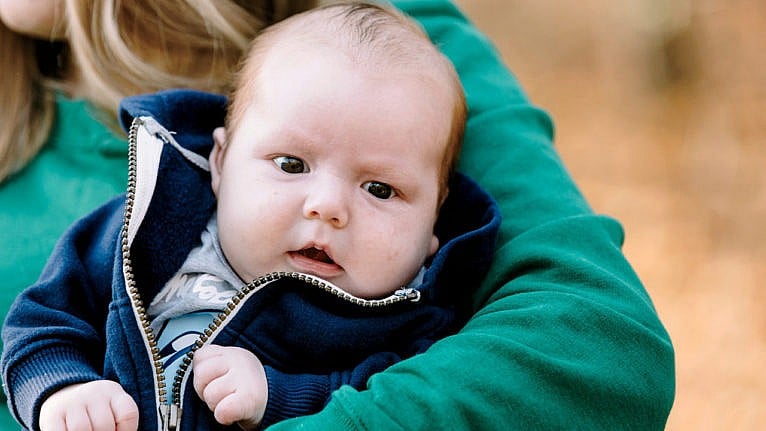With six weeks to go until her due date, Leah Cardin, a teacher in Burlington, Ont., was feeling confident in her birth plan. Her first labour, in 2017, had gone smoothly, and she hoped to have another positive experience with minimal interventions while delivering her second baby, who was due in April 2020. But then March Break arrived, along with a massive global health crisis, and everything changed. Her birth plan was no longer within her control.
The loneliness of pandemic pregnancies
“Most of my in-person midwife appointments were cancelled,” Cardin says. She saw her care provider face to face only twice in the last six weeks of her pregnancy, instead of weekly. She was told she couldn’t use nitrous oxide for pain management, as she had during her first labour. (Nitrous oxide requires respiratory equipment, which was in high demand, and there were concerns about aerosolization of COVID droplets, too. Labour and delivery departments have been reintroducing it since then, however.) A new set of rules was introduced at many hospitals, including mandatory masks (even for women in labour) and stringent symptom monitoring and screening questions at the door. Anyone with a runny nose, cough or fever would be asked to leave—including support partners like her husband.
Terrified that she might end up giving birth alone, Cardin decided to plan a home birth in order to avoid the hospital. She decided on a water birth and bought her own birthing pool (due to COVID, you couldn’t rent one at the time). Then, a week before her due date, Cardin was told that a water birth was no longer an option (midwives were being advised not to expose themselves to bodily fluids through water in a birthing tub). She was crushed, and reluctantly switched her birth plan back to a hospital birth. In an effort to keep everyone healthy, she isolated with her family in advance of her due date. She was also worried about the risks for her parents, who had agreed to care for her toddler while she was in labour, even though grandparents had been advised not to come into contact with anyone else. All these changes, and hard choices about risk and the safety of her loved ones, were agonizing.
“Normally I’d have the support of parents, grandparents, friends—some relief from the constant crying. But there was just no break. There was just nothing.”
“The pandemic is impacting expectant parents’ experience tremendously, especially for first-time parents,” says family medicine and obstetrics provider Tali Bogler. Last spring, Bogler started an Instagram account called the Pandemic Pregnancy Guide, a resource initially created for her patients at St. Michael’s Hospital in Toronto but that has become invaluable to many pregnant people. As information, recommendations and COVID rates change, moms-to-be are seeking guidance, answers and connections online.
“Even if you just look at how we deliver prenatal care, it’s changed,” says Bogler. “Many visits are done virtually for low-risk pregnancies. And across the board, there was the cancellation of in-person prenatal classes and hospital tours.”
The anxiety parents are feeling is very real, she says. “One in five pregnant and postpartum women experience depressive and anxiety symptoms at the best of times—that’s pre-pandemic,” explains Bogler. “The misinformation, the unknown effects of COVID-19 on pregnancy, on the mom, and on the fetus—it’s a vulnerable time to begin with, and then with the added stress of the pandemic and all the uncertainties that have come with it, it’s understandable that expecting parents are feeling even more anxiety right now.”
Photo: Jenna Marie Wakani
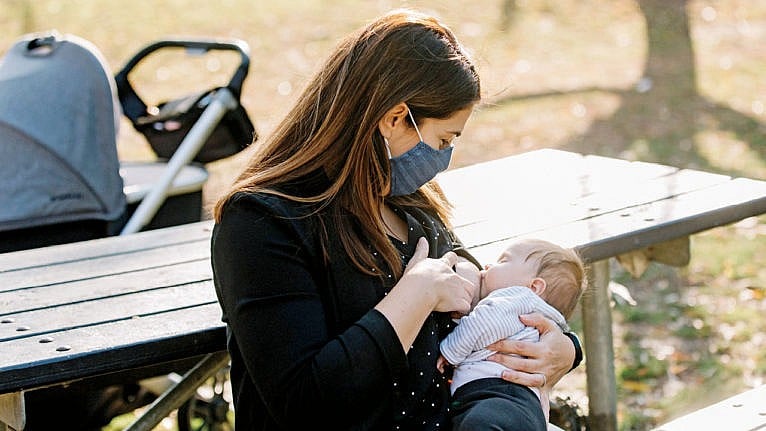
Photo: Jenna Marie Wakani
Simply put, having a baby right now is nothing like any parent expected it to be. There’s less hands-on care in pregnancy, more questions than answers, and even simple things like taking public transit on your way to a blood lab or ultrasound scan can seem like risky activities. Once the baby arrives, there’s a major lack of access to the village many new parents rely on. And while safety precautions are critical, they are not without emotional and mental health consequences.
In addition to feeling anxious, many new parents are feeling frustrated and angry. In the past 10 months, there were periods of time when Canadians in certain regions were allowed to meet up with a small group of friends at a restaurant, go to a bar, throw a small wedding or even hang out at a casino, but many pregnant women were still doing prenatal appointments over video. At times, they were told to go to a pharmacy to take their own blood pressure measurements, or decided to buy their own blood-pressure machines online. Doctors have told patients to use a tape measure to monitor the size of their own growing belly, or to buy a baby scale so they can do their own baby weigh-ins at home postpartum. Parents-to-be couldn’t take a tour of their hospital’s birthing wing, attend an in-person breastfeeding class, bring a partner with them to their prenatal appointments or ultrasounds, or, in some locations, hire a doula for the birth—all things that typically help you prepare for the arrival of a new baby. Expectant couples have missed out on so many key moments of a typical pregnancy journey, which has left many partners, in particular, feeling removed from the whole pregnancy experience.
Expectant couples have missed out on so many key moments of a typical pregnancy journey, which has left many partners, in particular, feeling removed from the whole pregnancy experience.
While ultrasounds are often a joyous highlight of pregnancy—and the moment a pregnancy truly starts to feel “real”—they can also be nerve-racking for first-time moms, and downright scary for those who’ve experienced pregnancy loss in the past. It’s hard to lie in a cold, quiet exam room, waiting to hear a heartbeat, scanning the ultrasound tech’s eyes for information, without being able to squeeze a partner’s hand for support.
Kate Borsato, a British Columbia–based therapist and clinical counsellor who specializes in providing support to new and expectant mothers, says she is seeing more women feel disconnected from their pregnancy and their baby. “Women are not being witnessed in their pregnancy—they’re having fewer appointments with their team, there’s no prenatal classes and they aren’t doing these rites of passages. There’s a grieving process that pregnant women and new moms are going through right now.”
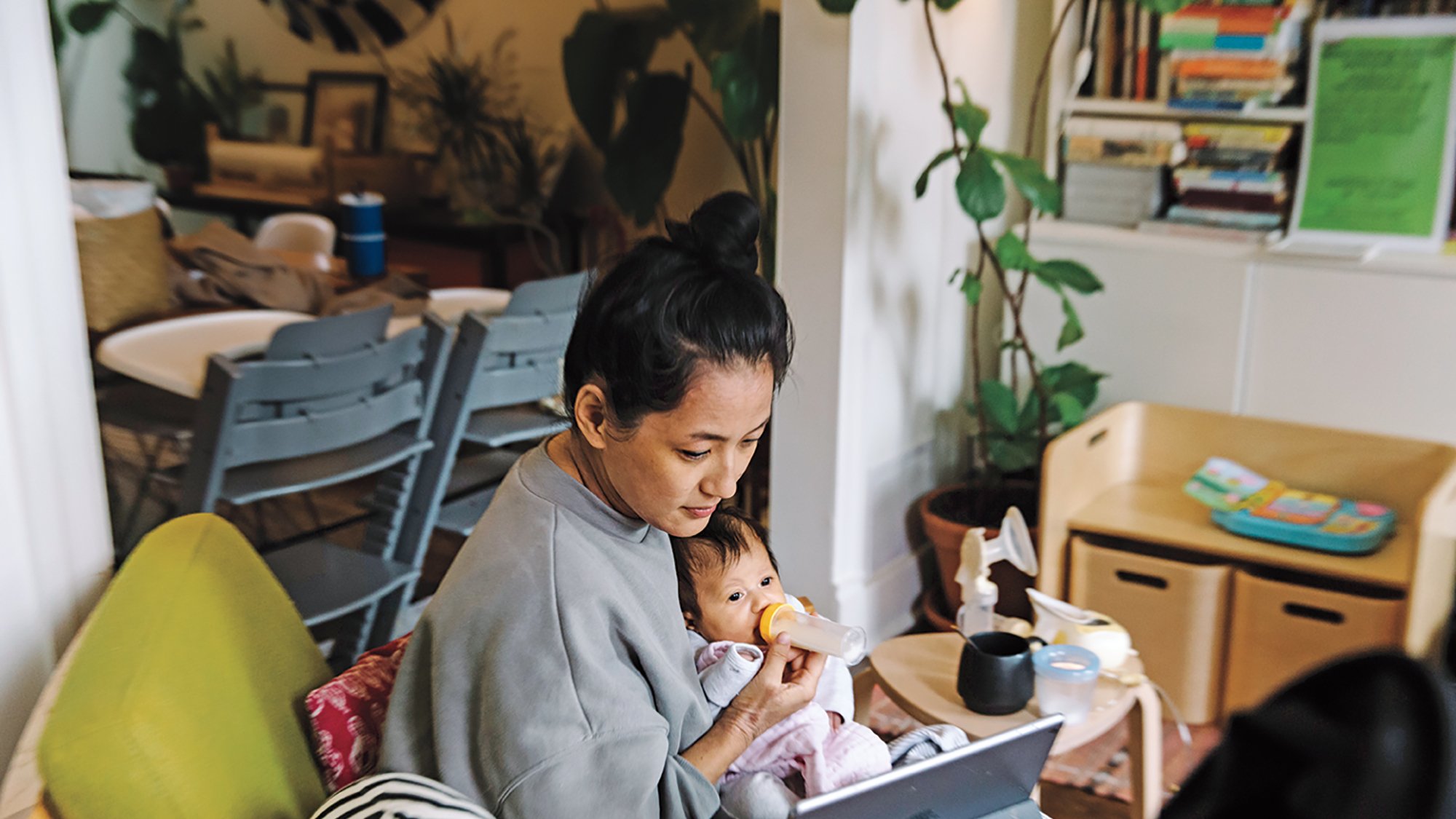
Photo: Jenna Marie Wakani
Moms who gave birth in 2020 have also shouldered the added mental load of keeping up with the constantly evolving news, including whether pregnant women are more vulnerable to COVID, or wondering what would happen if they contracted the virus while expecting or caring for a newborn. (Earlier in the pandemic, a new mom who tested positive during labour would be temporarily separated from her baby.) While we certainly know more about this now than we did in the first days of the coronavirus outbreak (thank goodness!), these were legitimate concerns that many parents did not have the answers to. And as if there weren’t already enough worries to keep pregnant women and new moms awake after a 3 a.m. feed, anxious thoughts can now easily start spiralling to include the economy, job losses and vulnerable or faraway family members, too.
Borsato explains that this is because when an individual feels overwhelmed, their nervous system activates as if they’re under threat. New moms aren’t just dealing with the usual sleep deprivation, hormonal crashes, breastfeeding challenges and the physical recovery after giving birth—there are added layers of isolation, helplessness and stress associated with the pandemic.
Coping without postpartum family support
In the end, Cardin chose to be induced so she and her husband could control their schedule and be in and out of the hospital within visiting hours. After a fast and hard labour, she delivered a healthy baby boy. Her midwives made home visits on day two and day five, but once her son was back up to his birth weight, all appointments became virtual. Then her husband returned to work and she was left to recover from a difficult delivery while caring for her toddler and a newborn with severe colic. The sense of isolation was immediate, and she describes her first six weeks postpartum during a pandemic as a “nightmare.”
“I was home with two kids every day and I just felt invisible—there were no other adults around,” she says. “I cried almost every day for the first few weeks, and those last six weeks of pregnancy. Normally I’d have the support of parents, grandparents, friends—some relief from the constant crying. Someone to entertain my daughter so I could hold the baby, or someone to hold the baby because I was up with him all night. There was just no break. There was just nothing.”
Cardin also felt robbed of the joyful anticipation of her baby’s birth, and she had no one to celebrate all the cute little baby milestones with.
“You had expectations for your pregnancy and you should be allowed to grieve that loss, even if you think your loss is ‘minor’ compared to someone else’s.”
Borsato often refers to these as “micro losses”—namely, the small but meaningful moments that expectant parents and new moms are missing out on, from gathering with loved ones for a big baby shower to joining a music class with their infant. These losses extend to family and friends as well. There is a simple, timeless joy to seeing a new grandparent hold their first grandchild or introducing cousins for the first time. No one but Grandma will be as thrilled as you are to witness that first hint of a smile or to celebrate baby’s first Christmas together.
A new mom’s ability to pop their baby into the stroller or car seat and casually run errands, go grab a fancy coffee or get out to the park has also been impacted by the pandemic, either due to stay-home orders, closed public spaces or personal comfort levels with risk, and it’s the loss of these daily “life savers” that Borsato sees as most problematic.
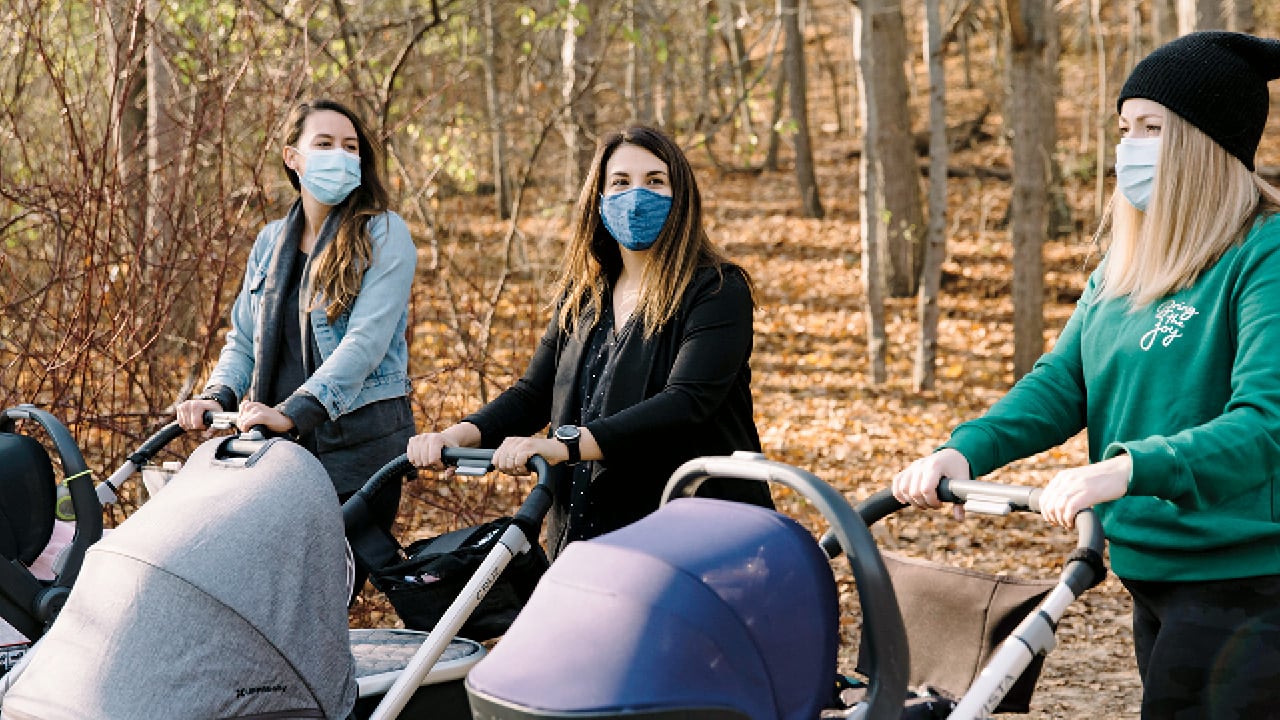
Photo: Jenna Marie Wakani
“The problem with being isolated and not having that social support is that even more is falling onto moms’ plates right now,” she says. “One of the most important factors for positive mental health postpartum is the degree of support a mom has.”
New moms can also struggle to reconcile their rosy expectations of motherhood with the reality (and exhaustion) of the daily grind. Even in the best of times, pre-COVID, that shift in your identity, or a sense that you’ve lost your “old life” and your freedom as an individual, takes time to adjust to.
“Many women downplay their emotions because they feel others have it worse, or judge themselves for mourning the loss of things they’ve deemed insignificant, like maternity photo shoots, but that shouldn’t be the case.”
“There can be a sense of being empty and lost in motherhood,” Borsato explains. “Not feeling like themselves, not loving this new job and feeling guilty that they’re not enjoying it. Many women embrace motherhood fully, as if it’s their job, but then they feel a crushing disappointment when it’s more demanding and isolating than they thought it would be, particularly now during the pandemic.”
Normalizing the struggle and finding hope for better days ahead
Borsato wants new moms who are struggling to feel seen and validated. She says many women downplay their emotions because they feel others have it worse, such as those with more immediate experience with COVID-19 or those who are working on the front lines. She sees many new moms judging themselves for mourning the loss of things they’ve deemed insignificant, like maternity photo shoots or joining a playgroup, but that shouldn’t be the case. “Those are things that make us feel good, and it’s OK to grieve that loss.”
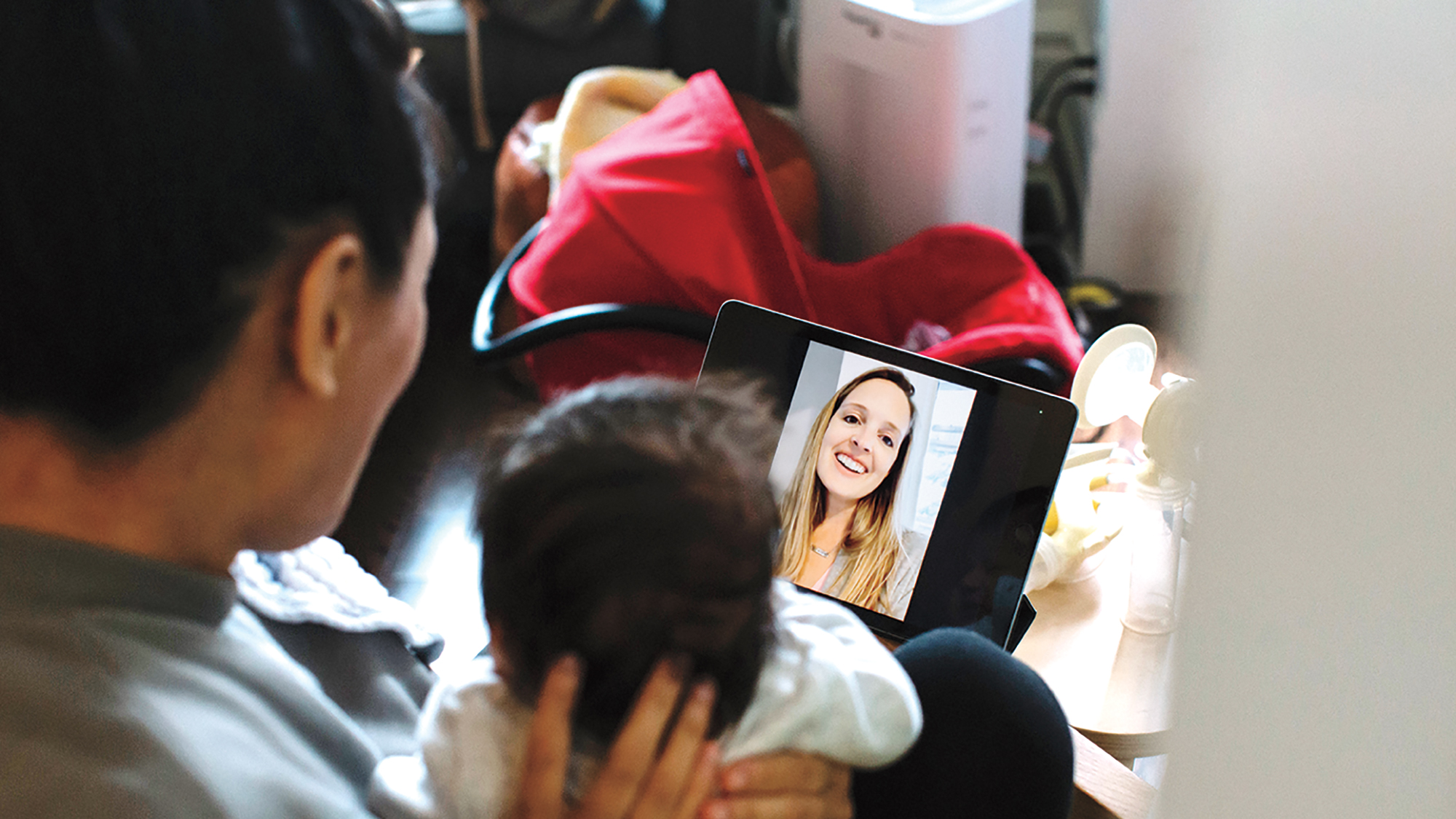
Photo: Jenna Marie Wakani
“I don’t believe mothers were ever intended to do everything on their own,” she adds. “Parents aren’t meant to do this alone.”
Bogler agrees. “You’re allowed to feel that way—it’s valid,” she says. “You had expectations for your pregnancy and you should be allowed to grieve that loss, or change, or difference, even if you think your loss is ‘minor’ compared to someone else’s.”
Bogler also wants to reassure expecting parents who are anxious about labouring alone that doctors and midwives are still going to prioritize a support person during labour, to the extent they can. “We are acutely aware of the essential role a support person plays during labour and childbirth,” she says.
Now, more than 10 months into quarantine with an infant and a toddler, Cardin is pragmatic about the future. They had been seeing the grandparents in person, but they’ve been cutting back on visits, and she knows that may change as the second wave progresses in her area. “I’ve been able to find a lot more joy in parenting these days,” she says. “But when I think about how long winter will feel, I still feel anxious about what’s to come. There’s a little voice in my head that says, ‘I can’t do it again.’ Right now, I’m just doing my best to take it one day at a time.”
